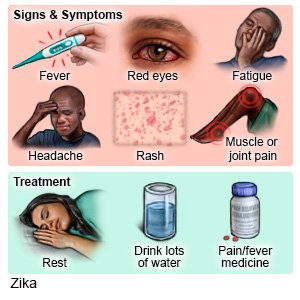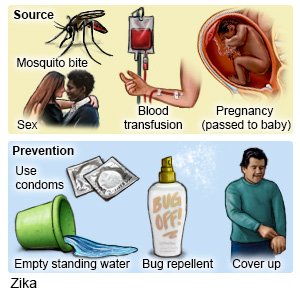Zika Virus in Children
Medically reviewed by Drugs.com. Last updated on Aug 1, 2023.
AMBULATORY CARE:
Zika virus
is carried by mosquitos. Your child may be infected with Zika virus through the bite of an infected mosquito. You may pass Zika virus to your child during your pregnancy. If your child is infected with Zika virus during your pregnancy, he or she may be born with birth defects such as microcephaly. Microcephaly causes your child to have a head and brain that is smaller than normal. Microcephaly also causes learning and development problems.
Common signs and symptoms:
Your child may not have signs or symptoms of Zika virus. If your child develops signs or symptoms, they may happen suddenly and last for 2 to 7 days. Your child may have any of the following:
- Fever
- Rash
- Headache
- Muscle or joint pain
- Red or itchy eyes
 |
Seek care immediately if:
- Your child stops urinating or urinates less than usual.
- The soft spot on your child's head is sunken inward or bulging outward.
- Your child has trouble walking.
- Your child is confused.
Call your child's doctor if:
- Your child's temperature is higher than 100.4°F (38°C).
- Your child has new symptoms.
- Your child has a fever for more than 24 hours.
- Your child has trouble breastfeeding or eating.
- Your child's symptoms do not get better in 1 week or get worse.
- You have questions or concerns about your child's condition or care.
Medicines:
Your child may need any of the following:
- NSAIDs , such as ibuprofen, help decrease swelling, pain, and fever. This medicine is available with or without a doctor's order. NSAIDs can cause stomach bleeding or kidney problems in certain people. If your child takes blood thinner medicine, always ask if NSAIDs are safe for him or her. Always read the medicine label and follow directions. Do not give these medicines to children younger than 6 months without direction from a healthcare provider.
- Acetaminophen decreases pain and fever. It is available without a doctor's order. Ask how much to give your child and how often to give it. Follow directions. Acetaminophen can cause liver damage if not taken correctly.
- Do not give aspirin to children younger than 18 years. Your child could develop Reye syndrome if he or she has the flu or a fever and takes aspirin. Reye syndrome can cause life-threatening brain and liver damage. Check your child's medicine labels for aspirin or salicylates.
- Give your child's medicine as directed. Contact your child's healthcare provider if you think the medicine is not working as expected. Tell the provider if your child is allergic to any medicine. Keep a current list of the medicines, vitamins, and herbs your child takes. Include the amounts, and when, how, and why they are taken. Bring the list or the medicines in their containers to follow-up visits. Carry your child's medicine list with you in case of an emergency.
Manage your child's symptoms:
- Give your child plenty of liquids as directed. Liquids can prevent dehydration. Ask how much liquid to give your child each day and which liquids are best for him or her.
- Have your child rest as directed. Ask your child's healthcare provider when he or she can return to normal activities.
Prevent Zika virus:
There is currently no vaccine to prevent Zika virus infection. Do not travel or bring your child to areas where Zika virus is common. Ask your child's healthcare provider where it is safe to travel. Prevent mosquito bites to help decrease your child's risk for infection:
- Apply insect repellent to your child. Ask your child's healthcare provider which insect repellent is right for your child. Follow directions on the insect repellent container. The following is a list of tips for insect repellent use:
- Do not apply insect repellent to a child younger than 2 months. Instead, dress your child in clothing that covers his or her arms and legs.
- Do not apply insect repellent to skin under clothing.
- Apply sunscreen to your child before you apply insect repellent.
- Put insect repellent on your child any time he or she will be outside. Put insect repellent on your child at all times if you travel or live in a high-risk area. Reapply insect repellent as directed.
- Do not apply insect repellent to a child's hands, eyes, mouth, or open skin.
- To apply insect repellent to a child's face, first apply it to your hands. Then apply it to the child's face. Do not touch the child's eyes or mouth with your hands.
- Apply insect repellent to your child every day for 3 weeks after he or she travels to high-risk areas.
- Apply insect repellent to your child's clothing and gear. This includes boots, pants, socks, and tents. Do this when your child camps, hikes, or plays outside. You can also buy clothing and gear that comes with insect repellent already on it.
- Dress your child in a long-sleeved shirt and pants. This will protect your child's skin from mosquito bites.
- Use screens and nets. Use a mosquito net around your child's bed. Cover your child's cribs, strollers, and baby carriers with mosquito nets. When you travel, choose a place to stay with screens on all windows and doors. Place screens over windows and doors in your home. Fix holes or tears in screens and nets, or buy new screens and nets.
- Keep doors and windows closed. If possible, use air conditioning to cool your home.
- Clean and empty containers of water once a week. Examples are animal bowls, buckets of water, gutters, flower vases, and bird baths. Mosquitoes lay eggs near water. Empty the water and scrub these containers with soap and water. Keep water containers covered with a tight-fitting lid, when possible.
- Use insect sprays inside and outside of your home. Use an insect spray that is safe to use inside of your home. Place a device that sprays mosquitoes outside of your home. Place it in a dark, cool, area. Ask your healthcare provider where to buy these items. Follow directions that come with these products.
 |
For the most up-to-date information on Zika virus:
Knowledge about the Zika virus is changing quickly. Get the most up-to-date information at:
- Centers for Disease Control and Prevention Information on Zika Virus
1600 Clifton Road
Atlanta , GA 30329
Phone: 1- 800 - 232-4636
Web Address: http://www.cdc.gov/zika/index.html
Support for families of babies born with microcephaly:
Caring for a baby born with microcephaly can be difficult. You may need help and support to care for your baby. Your baby's growth and development will need to be closely monitored. For more information and support:
- CDC: Information for Families of Newborns Affected by Zika
1600 Clifton Road
Atlanta , GA 30329
1600 Clifton Road
Atlanta , GA 30329
Phone: 1- 888 - 232-4027
Web Address: http://www.cdc.gov/zika/parents/families-of-newborns-affected-zika.html
Follow up with your child's doctor as directed:
If your infant is born with Zika virus, he or she will need close monitoring of growth and development. Your infant may need more tests. Older children should follow-up with a healthcare provider as directed. Write down your questions so you remember to ask them during your visits.
© Copyright Merative 2023 Information is for End User's use only and may not be sold, redistributed or otherwise used for commercial purposes.
The above information is an educational aid only. It is not intended as medical advice for individual conditions or treatments. Talk to your doctor, nurse or pharmacist before following any medical regimen to see if it is safe and effective for you.
Further information
Always consult your healthcare provider to ensure the information displayed on this page applies to your personal circumstances.
